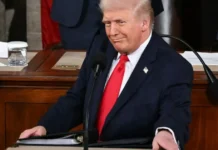
Written by Were Kelly
In a stark illustration of the political parallel realities in Washington, House Speaker Mike Johnson presided over the long-delayed swearing-in of Democratic Representative Grijalva, a basic function of government stalled by the ongoing shutdown, while simultaneously vowing to intensify efforts to release long-sealed documents related to the Jeffrey Epstein case. The ceremony, a constitutional formality that had been postponed due to the partisan impasse over federal funding, was conducted alongside a commitment that has become a rallying cry for certain political bases, creating a jarring contrast between procedural duty and political spectacle. The events of November 12-13 underscore the deep dysfunction gripping Capitol Hill, where fundamental governance is disrupted while contentious, symbolic battles are prioritised.
Speaker Johnson addressed both matters in his public remarks, seeking to frame them as different facets of his leadership. “The American people deserve transparency on the Epstein matter, and this House will use its powers to deliver it,” Johnson stated. “Meanwhile, we continue to fulfil our constitutional duties, even in these challenging times.” The push for the release of Epstein files, which involve the disgraced financier and his associates, is popular among conspiracy theorists and has been a persistent demand from a segment of the Republican base, though its relevance to current legislative priorities is questioned by many. For the newly sworn-in Representative Grijalva, the moment was bittersweet. “While I am grateful to be officially seated, it is a sad state of affairs that basic governance is held hostage,” Grijalva said. “My constituents deserve a functioning government, not political theatre.”
The confluence of these two actions did not go unnoticed by political observers. A noted political historian commented on the symbolism, noting, “The juxtaposition is striking: the perfunctory execution of a core democratic ritual alongside the fuelling of a politically charged conspiracy. It reflects the fractured and performative nature of current American politics. One action is about maintaining the institutions of government, however delayed; the other is about feeding a narrative of hidden corruption that often serves to undermine trust in those very institutions.” This approach allows the Speaker to cater to different audiences simultaneously, appeasing mainstream conservatives with the appearance of normalcy while energising his right flank with controversial pledges.
The practical implications are a continued stalemate on the budget, leaving hundreds of thousands of federal employees without pay and critical services in limbo. Critics from both parties have argued that the focus on issues like the Epstein files, while perhaps warranted on its own terms, becomes a damaging distraction when the machinery of government has ground to a halt. As the shutdown enters its next phase, the political theatre surrounding the swearing-in and the commitment to delve into historical scandals suggests that a swift return to functional governance is unlikely, with partisan point-scoring continuing to take precedence over legislative compromise and the basic operation of the federal state.


















